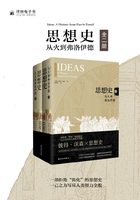
作者按
利奥·罗斯腾在他出版于1970年的《意第绪语的快乐》的“致谢”中,对一位朋友表示了感谢。这位朋友在对该书手稿的批评中,展现出他“对古代历史、拉丁语、希腊语、德语、意大利语、希伯来语、阿拉米语和梵语的熟稔”。正是最后的一笔让我很喜欢:阿拉米语和梵语。能够说英语、德语和意大利语已经令人惊叹了;加上拉丁语、希腊语和希伯来语,就已经能让你成为一个非凡的语言学家;再加上阿拉米语(耶稣说的语言)和梵语?这样的人,罗斯腾只在书中的另一处提到过,那是一位伟大学者,一位“拉比”,一个“聪明、睿智或学识广博的男人或女人”。在《思想史》这样的著作中,把学识和智慧视为同一是一件令人感到安慰的事情,但是罗斯腾很快打消了这样的希望。“这位年轻、聪明的拉比告诉祖母自己将要成为哲学博士。她自豪地笑了: ‘很好。但是哲学是一种什么病啊?'”注1
注1:在英语中“博士”和“医生”是同一个词。@@译注
在撰写本书的过程中,我本来需要很多像罗斯腾的朋友那样的人,因为本书的材料涵盖了多种语言写成的文献,包括阿拉米语和梵语。但是现在能找到的通晓多种语言的“马文”(意第绪语里的“专家”“鉴赏家”之意)不如以前那么多了。尽管如此,我的运气并不差,因为许多喜欢为大众读者撰写思想史的著名学者答应阅读部分甚至全部打印稿,让我从他们的专业知识中获益。在向他们致谢之前,我先要声明,书中遗留的错误、缺漏和语法问题都由我本人负责。接下来,我要向以下各位表示感谢。他们是:John Arnold, Peter J. Bowler, Peter Burke, Christopher Chippendale, Alan Esterson, Charles Freeman, Dominick Geppert, P.M. Harman, Robert Johnston, John Keay, Gwendolyn Leick, Paul Mellars, Brian Moynahan, Francis Robinson, James Sackett, Chris Scarre, Hagen Schulze, Robert Segal, Chandak Sengoopta, Roger Smith, Wang Tao, Francis Watson和Zhang Haiyan。在编辑和文字输入方面,我还要向以下人物表示谢意:Walter Alva, Neil Brodie, Cass Canfield Jr., Dilip Chakrabati, Ian Drury, Vivien Duffield, Hugh van Dusen, Francesco d'Errico, Israel Finkelstein, Ruth Fitzgibbons, Harry Fitzgibbons, David Gill, Eva Hajdu, Diana Harari, Philip Harari, Jane Henderson, David Henn, Ilona Jasiewicz, Raz Kletter, David Landes, Constance Lowenthal, Fiona McKenzie, Alexander Marshack, John Menzies, Patricia Menzies, Oscar Muscarella, Andrew Nurnberg, Joan Oates, Kathrine Palmer, Colin Renfrew, John Russell, Jocelyn Stevens, Cecilia Todeschini, Randall White和Keith Whitelam。如果没有来自三家图书馆的工作人员的帮助,本书不可能写完。它们是:英国剑桥大学的哈登人类学和考古学图书馆、伦敦图书馆、伦敦大学东方与非洲研究所图书馆。对它们的帮助,我至为感激。
在本书的结尾,共3550条参考文献。不过,这里我想请大家注意那些我参考最多的文献。研究并撰写《思想史》的一大乐趣是能够熟悉这么多的著作,它们虽然从来不是畅销书,却都是博学、有洞见、有学识的杰出作品。下面提到的不少著作都是同类作品中的经典之作,要不是因为本书的篇幅已经太长的话,我还想写一篇书目介绍,对以下清单中许多书的内容、研究方法和吸引人之处进行描述。其实,我只想说,以下清单包括的著作都是任何希望通晓思想史的人士的必备之书;而且,我对以下作者的感激之心没有止境。这些书给予我的快乐是无法衡量的。
按照作者/编者的姓氏字母顺序排列,它们依次为:Harry Elmer Barnes, An Intellectual and Cultural History of the Western World; Isaiah Berlin,The Sense of Reality;Malcolm Bradbury and James McFarlane(editors), Modernism:A Guide to European Literature, 1890—1930; Jacob Bronowski and Bruce Mazlish, The Western Intellectual Tradition; Edwin Bryant, The Quest for the Origins of Vedic Culture;James Buchan,The Capital of the Mind;Peter Burke,Culture and Society in Renaissance Italy;J.W.Burrow,The Crisis of Reason: European Thought, 1848—1914; Norman Cantor, The Civilisation of the Middle Ages; Ernst Cassirer, The Philosophy of the Enlightenment;Jacques Cauvin,The Birth of the Gods and the Origins of Agriculture; Owen Chadwick,The Secularisation of European Thought in the Nineteenth Century;Marcia Colish, Medieval Foundations of the Western Intellectual Tradition, 400—1400;Henry Steel Commager,The Empire of Reason;Alfred W.Crosby, The Measure of Reality: Quantification and Western Society; Georges Duby, The Age of the Cathedrals;Mircea Eliade,A History of Religious Ideas;Henri F.Ellenberger,The Discovery of the Unconscious;J.H.Elliott,The Old World and the New;Lucien Febvre and Henri-Jean Martin,The Coming of the Book;Valerie Flint, The Imaginative Landscape of Christopher Columbus; Robin Lane Fox, The Unauthorised Version; Paula Fredericksen, From Jesus to Christ;Charles Freeman,The Closing of the Western Mind;Jacques Gernet,A History of Chinese Civilisation;Marija Gimbutas,The Gods and Goddesses of Old Europe:6500 to 3500 BC;Edward Grant,God and Reason in the Middle Ages;Peter Hall,Cities in Civilisation;David Harris(editor),The Origins and Spread of Agriculture and Pastoralism in Eurasia;Alvin M.Josephy(editor), America in 1492;John Keay,India:A History;William Kerrigan and Gordon Braden,The Idea of the Renaissance;Paul Kriwaczek,In Search of Zarathustra;Thomas Kuhn,The Copernican Revolution;Donald F.Lach,Asia in the Making of Europe; David Landes,The Wealth and Poverty of Nations; David Levine, At the Dawn of Modernity; David C. Lindberg, The Beginnings of Western Science;A.O.Lovejoy,The Great Chain of Being;Ernst Mayr,The Growth of Biological Thought; Louis Menand, The Metaphysical Club:A Story of Ideas in America;Steven Mithen,The Prehistory of the Mind;Joseph Needham,The Great Titration; Joseph Needham et al., Science and Civilisation in China;Hans J.Nissen,The Early History of the Ancient Near East;Anthony Pagden, The Fall of Natural Man and People and Empires; J. H. Parry, The Age of Reconnaissance;L.D.Reynolds and N.G.Wilson,Scribes and Scholars;E.G. Richards,Mapping Time:The Calendar and Its History;Richard Rudgley,The Lost Civilisations of the Stone Age;H.W.F.Saggs,Before Greece and Rome;Harold C.Schonberg,Lives of the Composers;Raymond Schwab,The Oriental Renaissance; Roger Smith, The Fontana History of the Human Sciences;Richard Tarnas, The Passion of the Western Mind; Ian Tattersall, The Fossil Trail;Peter S.Wells,The Barbarians Speak;Keith Whitelam,The Invention of Ancient Israel;G.J.Whitrow,Time in History;Endymion Wilkinson,Chinese History: A Manual。
我还要请大家关注世界各大学出版社的赞助人和编辑。后面讨论到的许多最引人入胜和重要的著作从来不会成为商业选题;但是大学出版社的存在至少在一定程度上保证了新思想得到出版。为此,我们充满感激。我们还不应忘记本书提到的许多著作的译者(有些是匿名的,有些已经辞世多年)。正如利奥·罗斯腾所言,语言技能不应当被视为理所当然。
在关于中国的章节中,我使用了汉语拼音来进行音译而不是威妥玛注音,不过有些词的威妥玛注音即使对非专家而言也已经广为人知(拼音中没有撇号和连字符)。在抄录其他文字(例如阿拉伯语、希腊语、梵语)时,我几乎省略了所有的附加符号,因为大多数读者不知道å或ẹ如何改变原有的发音。只有在必不可少的情况下,我才保留了附加符号,例如,为了区别俄罗斯的史前遗址马尔他(Mal'ta)和地中海的马耳他岛(Malta)。大多数时候,我所说的“经书”指希伯来《圣经》,有时,为了避免重复,我也用《旧约全书》。
一如既往地,我最诚挚的谢意要献给凯瑟琳。